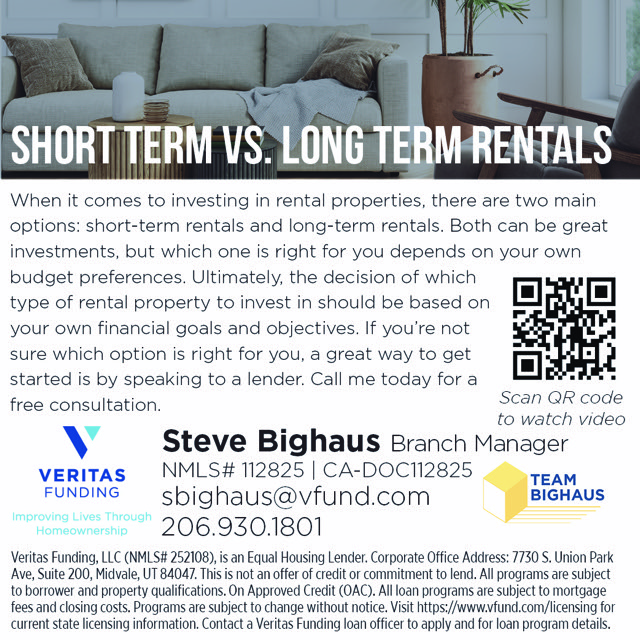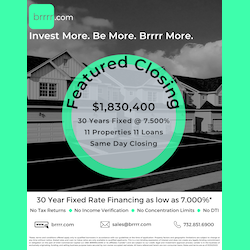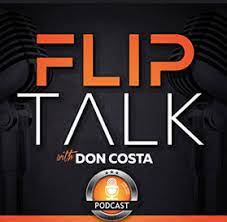|
Check out our new audio content!
Getting your Trinity Audio player ready...
|
Image from Pixabay
By Bruce Kellogg
The Reversing Interest Rate Trend
In 1980, only two years into real estate investing, I purchased two rental houses with 18% loans from Glendale Federal Savings, which is long gone. So are the two rentals, lost to foreclosure because I could not handle the resulting negative cash flow.
18% was the peak in mortgage rates at the time. In the subsequent 42 years, they have drifted down to the recent 3% range, largely due to fiscal and monetary actions taken by the U.S. government intended to manage the economy.
ADVERTISEMENT
Now, due to rampant inflation reaching 8.5% annually, the Federal Reserve Board has begun to raise rates rapidly. They never quantify their intentions, but reputable financial observers are predicting increases of 1.5% or more over the rest of 2022.
I believe that the long-term trend in interest rates is reversing now. I think this will change many aspects of the real estate industry in major ways. After 44 years in the business, I feel qualified to express what I envision happening in several areas. I’m thinking about what will be happening December 31, 2022 and beyond. Let’s see!
#1 – Mortgage rates have just reached 5.25% for conforming 30-year fixed rate loans. Adding in the Fed’s 1.5%, we get a conservative 6.75%. I say “conservative” because lenders will add 0.5% or so to protect themselves in the rising trend. So, 7.25% is also possible. Adjustable-Rate Mortgages (ARMs) will be cheaper for borrowers, but riskier in a rising rate environment.
#2 – Car loans are usually close to mortgage loans. Several years ago my son got one below 2% (barely). If these go to 7-8%, a lot fewer new cars will be bought. Vehicle, heavy equipment, and some consumer-financed goods will suffer sales declines. Production cuts and layoffs could result.

Image from Pixabay
#3 – The Federal Debt portfolio is huge and varied. But new, long-term federal bond issues could reach 5-5.5%. Recently in the 2% range, this will increasingly make it harder for the U.S. to service its debt. Additional borrowing, or tax increases, could be the result. Oh, oh!
#4 – SFR (Single-Family Residence) Listings will be low and will stay low. See the diagram (Source: Axios). 92% of homeowners say their home is affordable for them now. Houses are appreciating nicely so far. So, why list, find a new place, move, and pay more??? Some will list due to a job relocation, divorce, inheritance windfall, but not many for a “move up”. Homeowners are “set” at this time.
#5 – Buyers’ Offers will be fewer. With fewer listings, higher prices, and higher rates, the number of buyers will drop off. Prices could decline after a while. Some markets are “topping out” already. This is a local phenomenon, so pay attention!
#6 – Refinances were off 80% last week. This industry is destined to be hit hard. Loan agents will be leaving. Offices will be consolidating or closing. There’s no stopping it.
#7 – Real Estate Agents will thin out, also. Those with small clientele and/or high overhead (e.g., poor commission splits) will not make it. Some will downsize, prospect more, and further educate themselves. Grow professionally, and “hustle harder”!
ADVERTISEMENT
#8 – Real Estate Brokerages will also need to retrench. They have been on an “agent acquisition binge” for several years on the belief that more agents = more deals = more income. This has been true, but going forward many agents will add to costs, but not to revenues. Cull the flock. Get lean for the uncertain future.
#9 – “Flippers” are dropping out, and they should. Material costs are rising. There are supply shortages. Loans are more costly. Deep-discount acquisitions are scarce. Buyers are fewer and reluctant. I heard a speaker say 80% of “flippers” do one deal, then quit. In the coming times, that makes sense.
#10 – Syndicators will need to throttle back, also. Especially apartments, mini storage, industrial warehousing, and student housing, have been on a tear nationally this market cycle. “Gurus” have been teaching, and novices have been jumping in. The party is becoming more subdued. Lenders are raising rates and qualifying criteria. Investors are pulling in their horns. Opportunities are fewer and weaker. The bloom is off for syndication.
#11 – Ibuyers are companies, usually brokerages, who buy houses from homeowners as a service, refresh the home, then market it. They have abundant “Wall $treet money”, and they aim for a 7% margin or so. Most are losing money on this business model even in the current rising market. When the market turns, this will no longer be viable for them.

Image from Pixabay
#12 – Real Estate Technology Startups are a new model funded by venture capital and piloted by technology entrepreneurs. Their model involves combining real estate brokerage, lending, title work, and more, to make the process seamless for the consumer. This has been tried for 70 years already, but these people believe that the injection of technology is the key to it finally working. Two of them tried to recruit me. Amazingly, they offer a salary, bonus, health insurance, vacation, etc., in the traditional corporate mode. It was nothing like the old-style brokerage model! They have raised money in the $300-700 million range, so they can hold out a long time when the real estate industry inevitably contracts in the coming years. So, we’ll see.
#13. – Hedge Funds and other institutional investment vehicles have purchased tens of thousands of houses this market cycle. They have “crowded out” traditional homebuyers in many locations, and this has become upsetting to some. When this started, hedge finds targeted yields in the 6-8% range. Now that inflation is in the 8.5% range already and still rising, the yield to the investors is “walking backward”. Enough of this, and these funds might start liquidating their houses in substantial quantities. This could strongly impact SFR markets where it occurs. Some signs of this are starting to develop.
#14 – NNN Lease Properties are commercial properties that are sold to investors who want no involvement and just want a net check every month. Often they have a single tenant, like a Subway restaurant or a U.S. Post Office branch, which is very secure. During a real estate industry downturn, these properties become more risky. If the tenant vacates, or worse, files bankruptcy, things could become quite complicated. I had a client who owned six restaurant buildings during the 2008 Great Recession that a commercial broker had sold to him. Two stopped paying, and two went vacant. We saved them all, but only because he had cash reserves. That will be important in the days ahead.

Image from Pixabay
#15 – Homebuilders had ideal conditions until recently as they worked on the “housing shortage.” Since then: A) Materials prices went up. B) Supply chain delays got underway. C) Mortgage rates began increasing. D) Fewer buyers qualified, and more became reluctant. Fortunately, like farmers, homebuilders stay on top of their conditions. For now, many have gone to “building to order” rather than “building on speculation”. The future will dictate what else needs to be done.
Conclusion
Trends give rise to events, and the trend here is the increase in interest rates, probably over the long term. The foregoing discussions are presented to stimulate your anticipation and response to events as they unfold. Good luck, and I hope you enjoy the ride!

Bruce Kellogg
Bruce Kellogg has been a Realtor® and investor for 40 years. He has transacted about 800 properties in 12 California counties. These include 1-4 units, 5+ apartments, offices, mixed-use buildings, land, lots, mobile homes, cabins, and churches.
Mr. Kellogg is a contributor and copy editor for two national real estate wealth-building magazines: Realty411, and REI Wealth Magazine. He is a recipient of an Albert Nelson Marquis Lifetime Achievement Award, listed in Who’s Who in America– 2019.
He is available for consulting with syndication, turnkey, joint-venture, and other property purchasers and note investors nationally, and other consulting assignments. Reach him at [email protected], or (408) 489-0131.
Learn live and in real-time with Realty411. Be sure to register for our next virtual and in-person events. For all the details, please visit Realty411.com or our Eventbrite landing page, CLICK HERE.






















